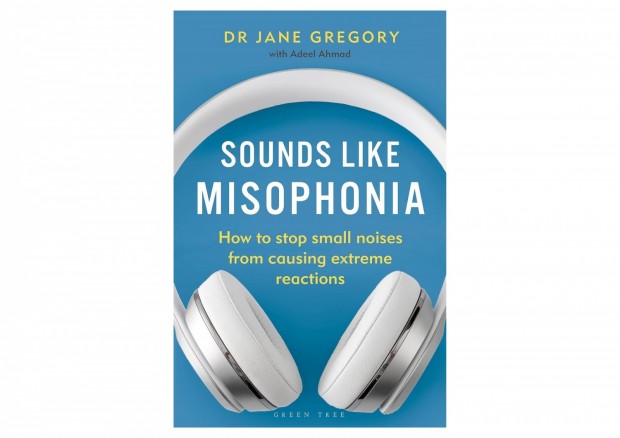Jane Gregory Shares Personal Experience and Practical Guide in New Book ‘Sounds Like Misophonia’

Discover a personal and practical guide in Jane Gregory's latest book, 'Sounds Like Misophonia: How to Stop Small Noises from Causing Extreme Reactions.' (Photo : Amazon/Jane Gregory)
In her new book, 'Sounds Like Misophonia: How to Stop Small Noises from Causing Extreme Reactions,' Oxford University professor Jane Gregory discusses misophonia. This condition makes people upset when they hear certain sounds, like chewing or tapping. Gregory and Adeel Ahmad explore the details of misophonia, sharing a special viewpoint based on Gregory's own experiences with the condition.
Misophonia is a condition in which certain sounds make someone feel strong emotions, like annoyance or anxiety. It can even affect their daily lives, relationships, and overall feelings.
Gregory explains that misophonia is more than just being sensitive to sounds. It is more complicated and involves factors like struggling to ignore specific noises, attaching negative meanings to certain sounds, and carrying emotional baggage tied to those sounds. Gregory mentions that she can handle her misophonia, but it can be a huge issue for others.
In a conversation with Jennifer Brout, Gregory shares some details about the book and her experience of misophonia. Initially conceived as a letter to her teenage self, the book serves as a guide filled with wisdom that Gregory wishes she had possessed during her formative years. The language is accessible, aiming to engage readers and provide practical advice for managing misophonia.
One intriguing aspect of Gregory's exploration is her connection of misophonia to evolutionary and neurological contexts. Drawing parallels with meerkats and their super-guards, she explains how humans, like these animals, possess an innate ability to tune into subtle environmental changes. However, misophonia takes this heightened sensitivity to small noises to an extreme level, causing significant distress.
READ ALSO: Jean Twenge's New Book Dives Into the Differences Between Generations
Gregory elucidates how our brains, evolutionarily wired to detect potential threats, can turn everyday sounds into perceived dangers. The book explores the visceral nature of misophonia and the challenge of changing immediate reactions deeply ingrained by evolution.
Gregory advocates for practice and retraining the brain by addressing how to modify responses to misophonia. Recognizing the difficulty of changing visceral reactions, she suggests creative strategies, such as engaging in playful activities while exposed to trigger sounds or altering perceptions of their sources.
One key element discussed is cognitive behavioral therapy, which Gregory highlights as a valuable tool for understanding and reshaping thoughts about misophonia. However, she also introduces a unique concept - the Inner Miso Child - and explores how processing early misophonia experiences through imagery rescripting can significantly impact an individual's response to triggers.
Gregory explains that the Inner Miso Child involves revisiting and updating old memories from the current perspective, a process known as memory reconsolidation. Through an example from her own life, she illustrates how this technique has helped her connect a present-day struggle with misophonia to a childhood experience, ultimately providing comfort and understanding to her younger self.
In sharing her journey and research, Gregory's book contributes to expanding knowledge on the field of misophonia. The book also acts as a practical guide for individuals seeking to navigate and manage this challenging condition. 'Sounds Like Misophonia' combines scientific insights with a personal touch. The book offers hope, understanding, and actionable strategies for those affected by misophonia.
RELATED ARTICLE: 5 Positive Psychology Books to Make 2024 Your Best Year Yet
© 2023 Books & Review All rights reserved.
Popular Now
1
Books to Read After 'Fourth Wing': Top Picks for Fantasy and Romantasy Fans

2
‘The Secret Public’ by Jon Savage Book Review: An Insightful Look Into the LGBTQ Influence

3
Stephanie Regalado's 'If They Only Knew' Column Is Now A Book, Unleashing 60 Anonymous True Stories to Empower Women

4
'No Wire Hangers' Scene That Almost Did Not Happen: New Book Reveals Faye Dunaway's Struggles

5
Rare First Edition of Aphra Behn's Novel 'Oroonoko' Discovered in Kent: A Historic Literary Find

Latest Stories
Book Reviews
‘The Secret Public’ by Jon Savage Book Review: An Insightful Look Into the LGBTQ Influence

Book News
Stephanie Regalado's 'If They Only Knew' Column Is Now A Book, Unleashing 60 Anonymous True Stories to Empower Women

Book News
'No Wire Hangers' Scene That Almost Did Not Happen: New Book Reveals Faye Dunaway's Struggles

Book Reviews
‘The Perfect Couple’ by Elin Hilderbrand Book Review: A Captivating Summer Mystery

Book News
New Book ‘The Franchise’ Reveals Penguins President Kyle Dubas’ ‘Biggest Mistake’ as Maple Leafs GM











